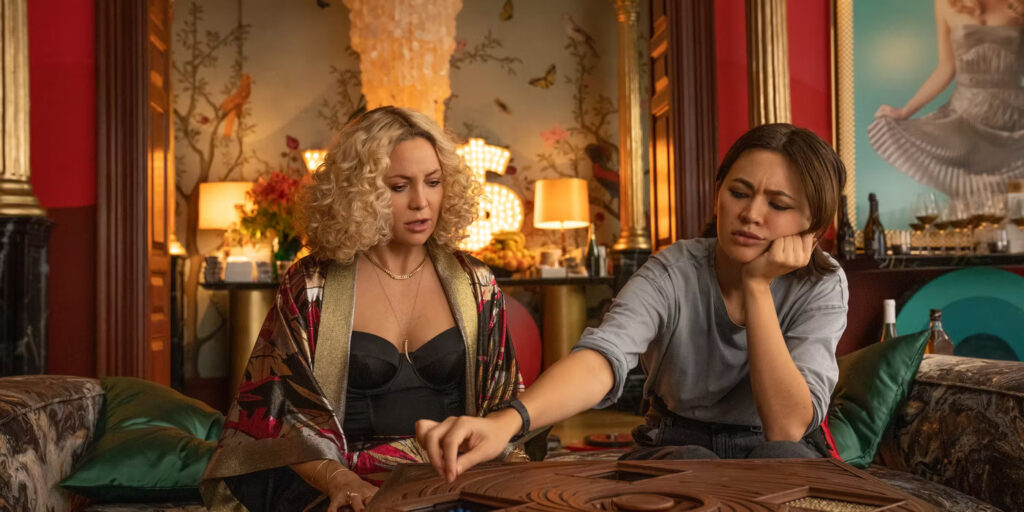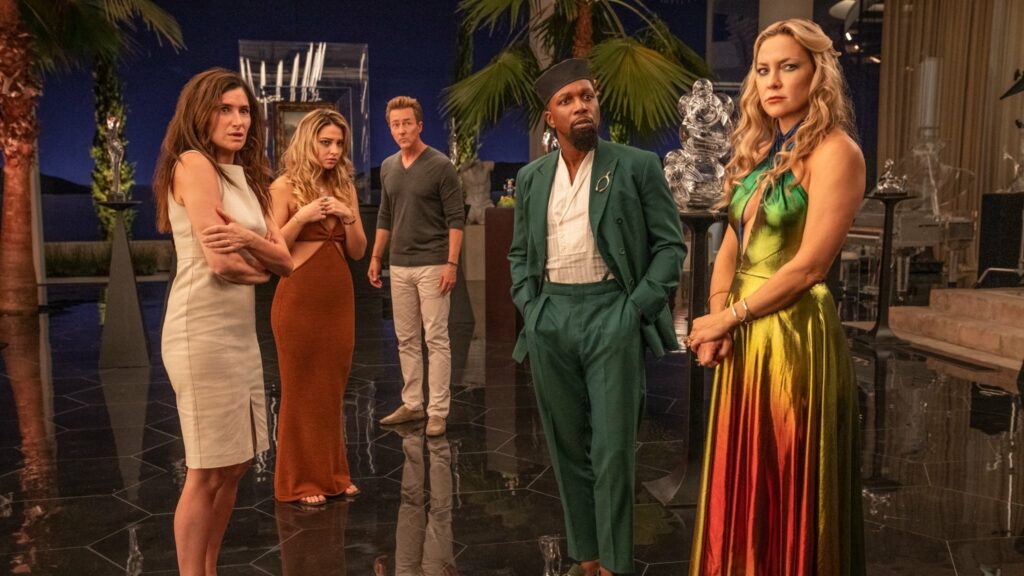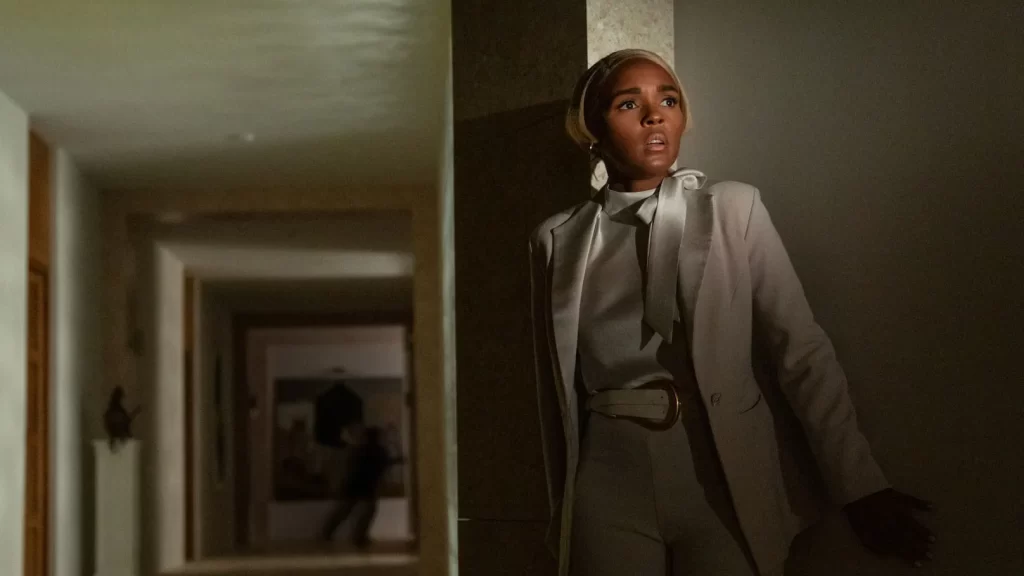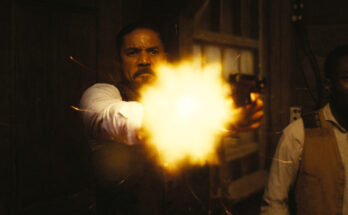Want to hear more from the actors and creators of your favorite shows and films? Subscribe to The Cinema Spot on YouTube for all of our upcoming interviews!
Managing editor & film and television critic with a Bachelor's of Arts in English Literature with a Writing Minor from the University of Guam. Currently in graduate school completing a Master's in English Literature.
There is the adage that “people who live in glass houses should not throw stones”. Well, that is not the case with the fictional billionaire Miles Bron (Edward Norton). Outside of its title alone, Rian Johnson’s Glass Onion as a concept is excellent in that its layers can be made transparent and shattered from within.
In this review, I will be discussing Rian Johnson’s newest murder mystery, Glass Onion. There will be no spoilers here, as the title of this article suggests. Nonetheless, please read ahead at your own discretion.

Discussion
To preface the meat of this review, I would like to speak for at least some of my co-writers and me by stating that we have been waiting for this follow-up sequel for quite some time. We highly recommend watching Johnson’s previous film, Knives Out. There, you get a taste of what Benoit Blanc (Daniel Craig) has in store for this next/current title.
Glass Onion is beautifully cast with a fresh roster of talented actors, and I cannot have asked for anyone better. I mean, this ensemble works so well together, arguably more so than in the first film. The way that the main cast members do seem like friends — although, we need to keep Duke Cody’s (Dave Bautista) fictional hair at the Glass Onion bar out of the conversation — and the fact that the casting team brought in some surprising cameo appearances are enough to keep me amazed.
At times, Yedlin’s cinematography comes off as something akin to how a Wes Anderson film is shot. Although, that does not mean it is a bad thing. Entirely the opposite with its use of contrazoom(s), pans, tilts, and other camera angles. That along with Duscay’s editing make for an interesting production, especially when it comes to the film’s non-linear plot structure. Glass Onion begins at one point, but jumps into a second act full of flashback scenes that weave into the first act, then wraps its final act up with a path toward Point Z. It is really the editing that keeps me enthralled in how the narrative is presented.
In regards to Bron’s island and his “Glass Onion” mansion, we have Heinrichs, Griff and the rest of the production staff to thank for the creation of the primary narrative — the surface layer of the story.
Johnson’s Screenwriting
The murder that becomes the critical point of the film occurs an hour and some seconds in. Every scene and event seems to be built up to that point, but then the entire second act builds up to that same point even more by providing a deluge of details. It is interesting how Rian Johnson makes that work. He plays around with typical clichés of mystery plots and allows them to distract us from what is really going on.
To compare Glass Onion to his previous series installment, Knives Out, would be much of a disservice to his craft as a storyteller. One is neither better nor worse than the other. Rather, each provides different tones to be gauged in terms of how the mystery is introduced and resolved. With Knives Out, the backdrop of the mystery involved a woman of color (Ana de Armas) whose class background was threatened by a family of affluent white people. Meanwhile, Glass Onion does still involve a rich white man. Yet, there is a different theme to be told here.

Wealthy Men and Their BS
First of all, the insinuated thing about Bron — pointed out by Blanc — is that he is a bullshitter, his speech consisting of made-up words and other errors. This brings me back to German literary and media studies scholar Roberto Simanowski’s MIT Press-published critical text, The Death Algorithm and Other Digital Dilemmas. In his first chapter, titled “Bullshit and Fast Food”, the writer defines bullshit as:
[That which] deceives people with empty talk, not distortions. It is without substance and, as feces, free of any nutritional value.
[W]hereas sugar and saturated fats merely reshape the bodies of individuals, … fast food changes the corpus of society and may be capable of creating the basis of a global community that is actually based on nothing.
[Furthermore, t]he global community presumes that it knows itself in all its facets and thus must restrict individuals’ freedom to decide about their own lives whenever that freedom butts up against knowledge about the lives of others.
When we’re talking about the creation of a global community, merely linking people is not enough. The important questions are: how and to what end? Otherwise, you might as well say that French fries and ketchup are part of healthy diet because they’re made of tomatoes and potatoes. And that would truly be bullshit.
Roberto Simanowski, The Death Algorithm and Other Digital Dilemmas, Chapter 1 — “Bullshit and Fast Food”
This chapter is directed at Facebook owner Mark Zuckerberg and the then-45th US President, Donald Trump. However, this can also apply to the current Twitter owner, Elon Musk, and others.
Disruption
I would like to think of Bron’s friends as representatives of this global community of which Simanowski writes. Each has a unique profession that helps change how the world is to function. As a matter of fact, their combined influence can be manipulated and controlled, more or less, by Bron himself, an apparent leader of the group. Over half an hour into the film, Bron tells Blanc why he and his friends refer to themselves as “disruptors”.
“If you want to shake things up, you start with something small. You break a norm, or an idea, or a convention, some little business model. But you go with things that people are kind of tired of anyway. Everybody get excited because you’re busting up something that everyone wanted [to be] broken in the first place. That’s the infraction point. That’s the place where you have to look within yourself and ask, ‘Am I the kind of person who will keep going?’
Will you break more things, break bigger things, be willing to break the thing that nobody wants you to break? Because at that point, people are not gonna be on your side… As it turns out, nobody wants you to break the system itself, but that is what true disruption is.”
Miles Bron (Edward Norton) in Rian Johnson’s ‘Glass Onion’ (2022)
Presenting this monologue without larger context, I do agree with Blanc’s later argument that Bron’s statement about disruption is “remedial at best”.
Brains vs. Bron
Gathered at the Glass Onion, I would like to assert that the “Disruptors” — a politician, a scientist, a fashion designer, an Internet streamer, a tech company billionaire — comprise the mega-machine that pulls the strings or make the smaller cogs move the right way. This brings me back to another critical text, Machine, which contains an essay by the late French philosopher, Bernard Stiegler, titled “For a Neganthropology of Automatic Society”.
In Machine, Stiegler writes about a new era of human living in which the media and digital networks are proletarianized and managed by the colossal capitalist entities: Facebook, Amazon, Apple, Netflix, and Google (FAANG). He states:
Stupidity … is what technological changes always produce … where a new stage of technological development interrupts and suspends social rules and behaviors and thereby destroys social systems. … [S]tupefaction and stupidity are being installed in … such a way that disruption can structurally and systemically short-circuit and bypass the knowledge.
Bernard Stiegler, “For a Neganthropology of Automatic Society”, via ‘Machine’
The Point
“So who cares what Johnson has to say?”, you might ask.
While all of Glass Onion is excellent, there is something merit-worthy about the idea/ concept of disruption. Disruption gets in the way of achieving true and actual change, the kind of change that benefits not just those at the top. The cogs and wheels of the machine, or, in Bron’s case, the layers of the Glass Onion, are presented to show how interconnected society and social groups thereof can be and are. Stiegler cites Indian economist, Amartya Kumar Sen, who says that the “[e]xpansion of freedom is viewed … both as the primary end and as the principal means of development”. Stiegler adds that “[f]reedom here is a question of knowledge insofar as it is a capability that is always both individual and collective”.
Freedom is a power that can be given or taken. In Glass Onion, this is the case of two parties: characters Bron and Brand (Janelle Monáe).

The Crew Behind Glass Onion
Tom Karnowski (Star Wars: Episode VIII — The Last Jedi, Knives Out) executive produces Glass Onion. Leopold Hughes (The Last Jedi, Knives Out) and Nikos Karamigios (Don Jon, The Last Jedi, Knives Out) serve as the co-producers of the film. Ram Bergman (Don Jon, The Last Jedi, Knives Out) and Rian Johnson serve as the producers.
Steve Yedlin (Looper, The Last Jedi, Knives Out) is the director of photography for Glass Onion. Bob Duscay (The Mummy franchise, G.I. Joe: The Rise of Cobra, Looper, Godzilla, The Last Jedi) serves as the editor.
Zachary Johnson is the storyboard artist for Glass Onion.
Nathan Johnson (Brick, Looper, Don Jon) composes the score for the film. Joseph Bonn (Orphan, Prometheus, Godzilla, The Last Jedi) is the music editor. Matthew Wood (There Will Be Blood, Star Trek Into Darkness, Inherent Vice, The Last Jedi, Star Wars Jedi: Fallen Order, The Mandalorian, Loki) and Josh Gold (Werewolf by Night) are the supervising sound editors. Gold also serves as the sound designer. Julie Glaze Houlihan (Malcolm in the Middle, Amazon Studios’ A League of Their Own) is the music supervisor.
Bret Howe (HBO’s Euphoria, The Menu) and Mary Vernieu (Bad Boys for Life, Cruella, We Can Be Heroes, The Whale, The Unbearable Weight of Massive Talent, Euphoria, Violent Night, A Christmas Story Christmas) serve as the casting directors for the film.
Benjamin Bermudez (Euphoria, The Unbearable Weight of Massive Talent, The Whale, The Menu) is the casting associate. Skyler Zurn (Brightburn, Euphoria Season 2, Glass Onion) serves as the casting assistant.
Aesthetics
Rick Heinrichs (Fargo, The Big Lebowski, Sleepy Hollow, the Pirates of the Caribbean franchise, Captain America: The First Avenger, The Last Jedi) is the production designer for the film. Andrew Bennett is the supervising art director. Elli Griff (Black Hawk Down, The Black Dahlia, Hellboy II: The Golden Army, Edge of Tomorrow) is the set decorator. Masako Masuda (Jurassic Park, Austin Powers in Goldmember, Terminator 3: Rise of the Machines, Avengers: Infinity War), Nevena Dilparić, and Milica Gruičić (Don’t Breathe 2) are the set designers.
Jenny Eagan (Now You See Me, True Detective, Beasts of No Nation, Maniac, Knives Out, The Adam Project) serves as the costume designer. Jessica Albertson (Neighbors, 22 Jump Street, Widows, Maniac, Knives Out, The Adam Project) is the assistant costume designer.
Jeremy Woodhead (The Lord of the Rings trilogy, Nanny McPhee, Speed Racer, Snowpiercer, Avengers: Age of Ultron, Doctor Strange) serves as the hair and makeup designer.
Giles Harding (Spectre, Cruella) serves as the visual effects supervisor. Tim Keene (Underworld, Love Actually, Mamma Mia!, Quantum of Solace, Avatar, About Time, The Last Jedi, Knives Out) is the VFX producer.
The Cast of Glass Onion
Daniel Craig portrays Benoit Blanc, the renowned detective and private investigator character of the Knives Out mystery franchise.
Edward Norton plays Miles Bron, a billionaire of a tech company called Alpha. Janelle Monáe portrays Helen and Cassandra “Andi” Brand, two twin sisters, the latter formerly Bron’s business partner.
Kathryn Hahn portrays Claire Debella, a politician. Leslie Odom Jr. plays Lionel Toussaint, the head scientist for Alpha. Kate Hudson plays Birdie Jay, a supermodel-turned-fashion designer. Jessica Henwick portrays Peg, Jay’s assistant.
Dave Bautista plays Duke Cody, a grown adult streaming influencer. Madelyn Cline portrays Whiskey, Cody’s girlfriend and his Twitch channel assistant.
Noah Segan plays Derol, a random man who is staying on Bron’s island. Jackie Hoffman portrays Ma, Cody’s mother, while Dallas Roberts appears as Devon Debella, Claire’s husband.
Ethan Hawke appears as “Efficient Man”, Bron’s assistant, while Hugh Grant appears as Phillip, Blanc’s partner.
Joseph Gordon-Levitt voices the “hourly dong” at Bron’s Glass Onion.

Performances and Character Developments
Craig’s Benoit Blanc has more to do in this film than he did in Knives Out, where he was not so much foregrounded. In Glass Onion, Johnson presents him as a protagonist with motives toward a larger goal: to do what he does best, which is solving mysteries. There is a stronger challenge presented to the character in this film, and I love how that challenge comes knocking at his doorstep.
Monáe’s character has range with what she is given. She represents the power that has been stripped of her. Brand is an enemy of the machine, aka Bron’s “disruptive” social clique. The actor is excellent in Moonlight, so I have no issue seeing her perform in Glass Onion. I love how she delivers her lines, especially one at the end of the film: “You would lie for a lie, but you won’t offer the truth.”
Partners in Crime?
Cline is a sight for sore eyes, but I think she has insufficient to do out of the entire bunch. As an actor with a developing filmography, I love what she has to offer as Whiskey. Perhaps I can be drunk off of her performance on a second watch. I hope to see her appear in more projects to eventually become on the same level as, say, Florence Pugh.
Henwick is lovely as Peg, who is as serious as her previous character, Bugs, in last December’s The Matrix Resurrections. Being Birdy Jay’s assistant, I admire how much she has to endure, especially when wisdom is a stranger to her boss. I honestly enjoy Peg as much as I do Whiskey. It seems that, with these latter two characters, there is more for them to do in the middle act of the film. That is where I feel they shine the brightest.
The Disruptors
There is something about Hahn that is different. Having seen her just recently in a rewatch of 2013’s Meet the Millers — along with her later performances in Spider-Man: Into the Spider-Verse and WandaVision — the actor showcases an evolution of her prowess to deliver remarkably in new roles. Glass Onion is categorized as a comedy. However, Hahn’s Claire Debella is exhibited as so serious that it stuns me to my core. The same can be said for Odom Jr., whom I have previously seen in Hamilton and The Many Saints of Newark. I only wish that he could have given more, being that he is a man of science.
I would have liked to see Bautista do more as Cody. Does he play video games on Twitch? It would have been hilarious to bring that aspect of his character role to the table. What rhetoric does he exactly spread as a “men’s rights activist”? He does well in the rock-solid role that Johnson writes for him, and I like how he interacts with the rest of the cast.
Hudson’s character is not a smart person. She is politically incorrect, but I do not think she is massively bigoted, just not informed. Intelligence just does not exist in her head, and that is what makes Jay hilarious as a character. I watched her earlier this August in Cameron Crowe’s Almost Famous, and she is such a gem. The actor carries that onto Glass Onion, holding as much weight as a character as Hahn does.
The Leader
Norton’s Bron is just as Blanc asserts: dumb. The character represents the billionaire archetype with financial power, odd rhetoric, and a lack of brain cells. I would not go so far as to consider Bron as a victim, which Norton portrays better in Fight Club. At the same time, I would not call him a villain, like in American History X. I feel indifferent to his performance, but what really matters here is what the character symbolizes.
Final Thoughts on Glass Onion
Glass Onion is its own individual story separate from Knives Out, the only commonality being a mystery that enlists Benoit Blanc as a detective. As a screenwriter, Rian Johnson continues to divide audiences with his ability to convey meaning in narrative. Everything about it is appealing in terms of aesthetics. However, I do believe the bigger picture is to distract—or disrupt—the viewers by displaying a surface layer of looks. By peeling the inner layers, we get to the middle, which is where the meaning resides. With this main cast having radiant dynamics with one another, all we can do is peek in and see how everything plays out. Again and again. Because it is that well done!
Rian Johnson’s Glass Onion is playing in select theaters and is streaming via Netflix!
Have you seen any of Johnson’s previous or current works? If so, then what are your thoughts on them thus far? Let us know! For more action and comedy-related news and reviews visit and follow The Cinema Spot on Facebook, Twitter, and Instagram!
Managing editor & film and television critic with a Bachelor's of Arts in English Literature with a Writing Minor from the University of Guam. Currently in graduate school completing a Master's in English Literature.





17 Comments on “‘Glass Onion’ Non-Spoiler Review – A Storytelling Powerhouse To Make A Writer Cry”